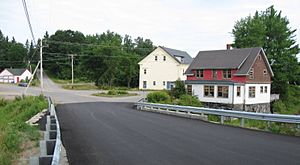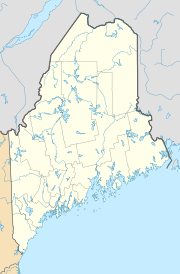Pembroke, Maine facts for kids
Quick facts for kids
Pembroke, Maine
|
|
|---|---|

Union Square in 2012
|
|
| Country | United States |
| State | Maine |
| County | Washington |
| Incorporated | 1832 |
| Area | |
| • Total | 35.26 sq mi (91.32 km2) |
| • Land | 27.36 sq mi (70.86 km2) |
| • Water | 7.90 sq mi (20.46 km2) |
| Elevation | 23 ft (7 m) |
| Population
(2020)
|
|
| • Total | 788 |
| • Density | 29/sq mi (11.1/km2) |
| Time zone | UTC-5 (Eastern (EST)) |
| • Summer (DST) | UTC-4 (EDT) |
| ZIP code |
04666
|
| Area code(s) | 207 |
| FIPS code | 23-57780 |
| GNIS feature ID | 0582667 |
Pembroke is a small town located in Washington County, Maine, in the United States. In 2020, about 788 people lived there. One cool thing about Pembroke is its unique 'reversing falls' at Mahar's Point. This happens when the ocean tide is so strong it makes the river water flow backward, creating rapids.
Contents
History of Pembroke
The area where Pembroke now stands was first called Pennamaquan by the Passamaquoddy Indians. Around 1774, settlers started to live here as part of a nearby area called Dennysville.
On February 4, 1832, Pembroke became its own town. The legislature named it after a town in Wales called Pembroke. The Welsh town was famous for building wooden ships, a skill that soon became important in Maine's Pembroke too.
Shipbuilding and Other Industries
Pembroke, Maine, had one of the best harbors in the state. This made it a great place for building ships. People were building vessels here as early as 1825. By 1859, when the town had 1,712 people, there were seven different shipyards working. Most of the ships built were schooners. These were used for coastal trade, moving goods along the coast, or for fishing.
Besides shipbuilding, Pembroke had other important industries. There was a factory that worked with stone, and several mills. These included three sawmills for cutting wood, one gristmill for grinding grain, and mills for making shingles and laths (thin strips of wood).
Near the head of tide (where the river meets the ocean), the Pembroke Iron Company was set up in 1832. By 1856, this company was making almost 5,000 tons of iron products each year, like spikes, rivets, and nails. Farming was also a common job for people in Pembroke. In 1880, the town's population grew to 2,324 people.
Geography of Pembroke
Pembroke covers a total area of about 35.26 square miles (91.32 square kilometers). Most of this area, about 27.36 square miles (70.86 square kilometers), is land. The rest, about 7.90 square miles (20.46 square kilometers), is water.
The Pennamaquan River flows through Pembroke, and the town is located on Cobscook Bay. Major roads that go through Pembroke include U.S. Route 1 and Maine State Route 214.
Population Information
| Historical population | |||
|---|---|---|---|
| Census | Pop. | %± | |
| 1840 | 1,050 | — | |
| 1850 | 1,712 | 63.0% | |
| 1860 | 2,299 | 34.3% | |
| 1870 | 2,551 | 11.0% | |
| 1880 | 2,324 | −8.9% | |
| 1890 | 1,514 | −34.9% | |
| 1900 | 1,652 | 9.1% | |
| 1910 | 1,378 | −16.6% | |
| 1920 | 1,168 | −15.2% | |
| 1930 | 965 | −17.4% | |
| 1940 | 1,029 | 6.6% | |
| 1950 | 998 | −3.0% | |
| 1960 | 871 | −12.7% | |
| 1970 | 700 | −19.6% | |
| 1980 | 920 | 31.4% | |
| 1990 | 852 | −7.4% | |
| 2000 | 879 | 3.2% | |
| 2010 | 840 | −4.4% | |
| 2020 | 788 | −6.2% | |
| U.S. Decennial Census | |||
2010 Census Details
In 2010, there were 840 people living in Pembroke. These people lived in 358 households, and 236 of these were families. The town had about 30.7 people per square mile. There were 531 housing units in total.
Most of the people in Pembroke were White (94.9%). There were also small numbers of Native American (1.3%), Asian (0.4%), and African American (0.1%) residents. About 1.0% of the population was Hispanic or Latino.
About 28.2% of households had children under 18 living with them. Nearly half (49.7%) were married couples. The average household had 2.30 people, and the average family had 2.68 people. The median age in Pembroke was 48.5 years old.
Famous People from Pembroke
- Charles Best: A Canadian medical scientist who helped discover insulin. His father was a doctor in Pembroke.
- Styles Bridges: A teacher and editor who became the 63rd governor and a U.S. senator for New Hampshire.
- William Robinson Pattangall: A Maine attorney general and later the chief justice of the Maine Supreme Court.
Images for kids
See also
 In Spanish: Pembroke (Maine) para niños
In Spanish: Pembroke (Maine) para niños
 | Selma Burke |
 | Pauline Powell Burns |
 | Frederick J. Brown |
 | Robert Blackburn |



